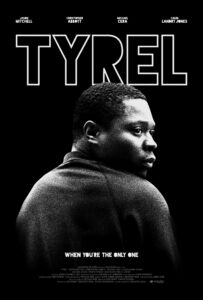Mumblecore lives in Sebastián Silva’s rambling, but effective, dude-bro social commentary.
When Tyler (Jason Mitchell) tags along with Johnny (Christopher Abbott) on a visit to a mountain cabin for a weekend of debauchery with the boys, he finds himself instantly uncomfortable. As the 
 only African American member of the group and new to their juvenile traditions, Tyler isn’t sure just how to act. Is anything out of bounds? What’s a joke and what’s meant to be taken seriously?
only African American member of the group and new to their juvenile traditions, Tyler isn’t sure just how to act. Is anything out of bounds? What’s a joke and what’s meant to be taken seriously?
Feeling very much like an improvised feature, Silvia sets the camera loose as the attractive assortment of character actors, which includes a colorful performance by Michael Cera, riff at length about various topics often inspired by whatever they are drinking or eating at the moment. One recurring theme is the aspect of games, played at various points during the endless party. And when one game has each player adopting an accent dictated by slips of paper drawn from a hat that is passed around, Tyler is made even more uncomfortable when he’s asked to parrot a black voice.

Situations involving race test Tyler’s friendship with Johnny, who, like Tyler is constantly looking to his friend for some reassurance that feelings aren’t hurt, when the language cuts too close to the bone. And when Michael Cera’s rich kid, Alan, tries to gloss over the disquiet brewing among them, he risks endorsing the very thing that all of them collectively hope to avoid. Modern twenty-somethings might want to look beyond race and prejudice by making a joke of it all, but the insensitivity can’t be escaped as lasting effects tend to linger long.
For anyone who hopes to disarm the race issues by confronting them directly and infusing a measure of humor into the mix, “Tyrel” is a film that will hit you with a cold slap. Watching this film may cause viewers to reevaluate the way they communicate with others, particularly with persons of color and other legally suspect classes. For example, at one point, a character uses an awful expletive to describe a person who is gay. The character’s contextual use of the 1980s term is not meant to insult, but the mere utterance of the word is wrong.

At the same time, clearly Silvia wants to make the point with “Tyrel” that discussing one’s prejudices is a good thing. And through the dude-bro weekend conceit, he’s able to show both the right and wrong ways of approaching these prickly issues.
Visually, “Tyrel” is interesting. “The Florida Project” cinematographer Alexis Zabe is constantly moving the camera, using wide angle lenses extensively. This makes the edges of his image bend and even stretch things in the background. It injects a sense of unease into a drama giving the film a pot boiling dramatic feel. And Silvia smartly has the camera trained on character perspective—Tyler then Johnny and back again. We feel something of their mutual discomfort and frustrations.

Naturally, comparisons to “Get Out” are inevitable when discussing “Tyrel.” However, the two films may share the fish out of water narrative and race questions, but where “Get Out” intertwined this with horror and science-fiction, “Tyrel” allows the tension to build in a realistic manner through the rambling conversations that are the product of copious amounts of alcohol and marijuana. Silvia’s script is less structured and focused as well, borrowing from the low-budget mumblecore tradition that delivers either hit or miss. And this is a film that hits hard far more than it misses.
